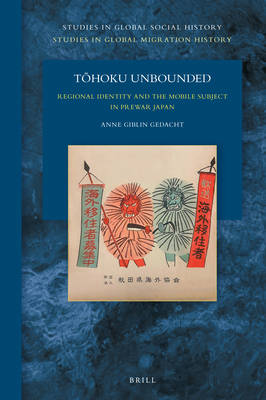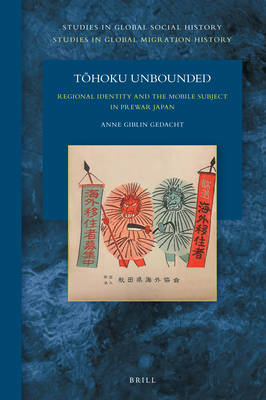
- Afhalen na 1 uur in een winkel met voorraad
- Gratis thuislevering in België vanaf € 30
- Ruim aanbod met 7 miljoen producten
- Afhalen na 1 uur in een winkel met voorraad
- Gratis thuislevering in België vanaf € 30
- Ruim aanbod met 7 miljoen producten
Zoeken
Tōhoku Unbounded: Regional Identity and the Mobile Subject in Prewar Japan
Anne Giblin Gedacht
€ 221,45
+ 442 punten
Omschrijving
In 1870, a prominent samurai from Tōhoku sells his castle to become an agrarian colonist in Hokkaidō. Decades later, a man also from northeast Japan stows away on a boat to Canada and establishes a salmon roe business. By 1930, an investigative journalist travels to Brazil and writes a book that wins the first-ever Akutagawa Prize. In the 1940s, residents from the same area proclaim that they should lead Imperial Japan in colonizing all of Asia.
Across decades and oceans, these fractured narratives seem disparate, but show how mobility is central to the history of Japan's Tōhoku region, a place often stereotyped as a site of rural stasis and traditional immobility, thereby collapsing boundaries between local, national, and global studies of Japan.
This book examines how multiple mobilities converge in Japan's supposed hinterland. Drawing on research from three continents, this monograph demonstrates that Tohoku's regional identity is inextricably intertwined with Pacific migrations.
Across decades and oceans, these fractured narratives seem disparate, but show how mobility is central to the history of Japan's Tōhoku region, a place often stereotyped as a site of rural stasis and traditional immobility, thereby collapsing boundaries between local, national, and global studies of Japan.
This book examines how multiple mobilities converge in Japan's supposed hinterland. Drawing on research from three continents, this monograph demonstrates that Tohoku's regional identity is inextricably intertwined with Pacific migrations.
Specificaties
Betrokkenen
- Auteur(s):
- Uitgeverij:
Inhoud
- Aantal bladzijden:
- 292
- Taal:
- Engels
- Reeks:
- Reeksnummer:
- nr. 48
Eigenschappen
- Productcode (EAN):
- 9789004527935
- Verschijningsdatum:
- 8/12/2022
- Uitvoering:
- Hardcover
- Formaat:
- Genaaid
- Afmetingen:
- 155 mm x 235 mm
- Gewicht:
- 583 g

Alleen bij Standaard Boekhandel
+ 442 punten op je klantenkaart van Standaard Boekhandel
Beoordelingen
We publiceren alleen reviews die voldoen aan de voorwaarden voor reviews. Bekijk onze voorwaarden voor reviews.











